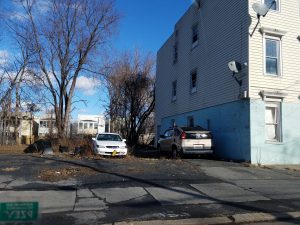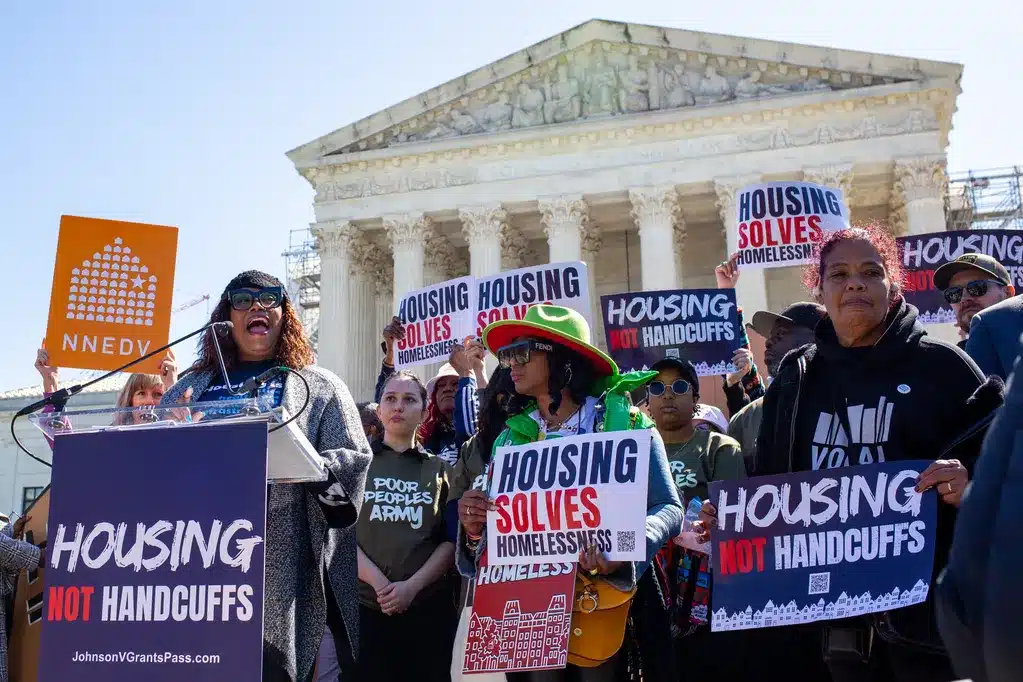On First Street in Albany’s West Hill neighborhood, there sits a flourishing community garden. Here, neighbors grow lavender and spinach and raspberries. Youth in the community tend to the plots.
Just a decade earlier, though, this same stretch of land in upstate New York was bare. In the garden’s place was a cluster of vacant, boarded-up buildings and some empty gravel lots.
In cities across the country, it is in neighborhoods like West Hill—low-income, historically redlined, and home to many Black residents—where vacant and abandoned properties are concentrated. These lots and buildings are harmful to residents as they tend to attract crime to the area, increase environmental and health hazards, and lower the value of nearby homes.
Over the last several years, the city has ramped up its efforts to combat vacancy. And one critical tool to do so has been the Albany County Land Bank Corporation, a not-for-profit organization established by the county to acquire vacant or troublesome properties and revive them.
In West Hill, the land bank acquired that cluster of buildings on First Street and worked with Eden’s Rose Foundation, a local nonprofit, to transform the land. So emerged Albany Victory Gardens, now a vibrant resource for the neighborhood. “We have taken vacant land in a food desert and converted it to a community oasis,” Greg Sheldon, the foundation’s director, says of the partnership on the land bank’s website.
In recent months, however, the Albany County Land Bank has been acquiring far fewer properties than it once did. That’s in part due to a May ruling by the U.S. Supreme Court—Tyler v. Hennepin—which has generally been touted as a safeguard for homeowners against certain harmful tax foreclosure practices. Less attention, however, has been paid to the potential threat the ruling has on land banks and other programs that fight vacancy and neglectful landlords, and how it could potentially benefit speculators.

“Right now, there are a lot of unknowns,” says Adam Zaranko, the executive director of the Albany County Land Bank and president of the New York Association of Land Banks.
New York is one of about a dozen states whose tax foreclosure system will be affected by the ruling. Others include Ohio, Michigan, New Jersey, Illinois, and Wisconsin. Because land banks in these states acquire properties through the tax foreclosure system, they now face uncertainty. Some have slowed property acquisitions significantly in recent months, several land bank leaders told Shelterforce.
“Addressing harmful vacant properties really relies on this effective and efficient link between the tax foreclosure system and land banks that Tyler may now undermine,” says Tarik Abdelazim, director of national technical assistance at the Center for Community Progress, a national nonprofit organization that fights to revitalize vacant properties.
“And that’s unfair to disinvested neighborhoods with high levels of vacancy, many of which are disproportionately home to people of color.”
The Case—Reclaiming Lost Equity
The story behind the Tyler ruling pulls at the heartstrings. The plaintiff in the case was Geraldine Tyler, a 94-year-old grandmother from Minneapolis. In 1999, Tyler bought a small condo in the city. A decade later, she moved out of her home and into a senior living complex. After she left her condo, she stopped paying her property taxes.
By 2015, Tyler owed $15,000 on the property, between the past-due taxes and accumulating interest and penalties. Enough time had passed that under Minnesota law, Hennepin County was permitted to take ownership of the property, which it did. In 2016, the state put Tyler’s condo up for auction, and sold it to the highest bidder, for $40,000.
And herein lies the crux of the ruling: Tyler owed $15,000, yet the county sold her home for more than twice that: $40,000. The difference—$25,000—was pocketed by the state, instead of being given back to Tyler, a practice allowed by Minnesota’s tax laws.
The Supreme Court, in a unanimous decision, ruled that such a practice violated the takings clause of the Fifth Amendment. “A taxpayer who loses her $40,000 house to the State to fulfill a $15,000 tax debt has made a far greater contribution to the public fisc than she owed,” Justice John Roberts wrote in the decision.
That a woman whose home was taken and sold at a premium should be able to keep her own equity—it’s a decision that seems straightforward. But its impacts will be far more broad, experts say.
The Cycle of Speculation
Properties that fall into tax foreclosure generally make their way through the courts and are eventually put up for auction, winding up in the hands of the highest bidder, if there is a bidder at all. In some cases, these tax-delinquent properties are owned by people like Tyler—individuals, often elderly, who cannot pay their taxes or perhaps don’t even know they are delinquent. But that’s not always the case.
Instead, it’s often what Gus Frangos, president of the Cuyahoga County Land Bank in Ohio, describes a “cycle of speculation.” Investors buy a foreclosed property at a tax auction and flip it to another speculator, who then may flip it again, or abandon it altogether, sending the property back to foreclosure.
In other cases, landlords may be profiting from a tax delinquent property, a practice that Abdelazim witnessed “over and over again” while serving as deputy mayor in Binghamton, New York, he says.
In this “business model,” landlords buy a property for cheap at auction, then rent it out, often to tenants with few other housing options, he says. “They would intentionally not pay taxes, and they knew they had three and a half years to collect on rents at this two- or three-unit house before intentionally losing it to the government again via foreclosure,” Abdelazim explained. “They’d churn through this tax foreclosure process year over year. This entire time, they’re harming the remaining neighbors and the neighborhood,” he says.
“And they made a killing off of housing some of our most vulnerable tenants in unsafe conditions.”
The auction system doesn’t give local governments any way to prevent problems like this, Abdelazim says. Tyler, a ruling ostensibly to protect the equity of homeowners, may end up benefiting such speculators.
Not only does the Supreme Court ruling require returning “excess equity” to an owner who may never have intended to pay property taxes, and whose property has been causing external costs in terms of safety and quality of life for neighbors and local government—it may disrupt the land bank model all together.
How the Ruling May Affect Land Banks
Land banks were designed to intervene in the cycle of abandonment and speculation created by the tax foreclosure system. They generally take possession of foreclosed properties and sell them to a homeowner or nonprofit organization, or they use the properties for projects like that flourishing community garden in Albany.
The land bank movement has grown significantly over the last two decades, and today, there are hundreds of land banks across 29 states, according to data from the Center for Community Progress.
Some states allow land banks and local governments to acquire properties in the foreclosure process before the property goes up for public auction. But after the Tyler decision, any state that allows land banks or governments to acquire properties that way may be subject to legal risk, experts say. And that’s true even if they have another way to return surplus equity back to the former owner. That’s because a public auction, in the eyes of the courts, is likely the most accurate way to determine the value of a property. And therefore, it’s likely the safest way to determine how much a former owner might be owed.
“A public auction is the most likely mechanism to withstand future legal challenges from former owners,” says Matt Kreis, general counsel at the Center for Community Progress.
Another means—like getting an appraisal of a property’s value, and then using it to determine what excess value to pay to the owners—is riskier, he says, although the SCOTUS ruling didn’t outright bar such practices.
But because of their susceptibility to speculation, tax auctions are a practice that certain states, such as New York, have worked to move away from. “We certainly would not like to see [the return of tax auctions] at scale in New York,” says Zaranko, the Albany land bank president.
In Flint, Michigan, for instance, nearly two-thirds of properties sold at auction between 2008 and 2014 went through foreclosure again soon after. In contrast, only 1 percent of properties sold by the county land bank did, according to a 2016 study by the Center for Community Progress.
States have different ways to circumvent such sales. Some, like Ohio, allow direct transfers of property to land banks when a property is abandoned. Others, like New York, give land banks preference over other bidders at an auction. But states that have enacted any such reforms are at risk.
“So long as there is a direct transfer to the county land bank, you’ve opened up yourself up to Tyler v. Hennepin County risk,” says Jeffry Harris, an Ohio attorney who counsels county land banks.
The impact of Tyler on land banks and other programs that combat vacancy will differ by state. And the exact contours are still taking shape.
In Cuyahoga County in Ohio, Frangos says the land bank has slowed its acquisitions since the ruling. “Only because we have to be a little bit careful what we bring in,” he says.
Harris, meanwhile, says he has seen land banks across the state pause acquisitions, and only in recent weeks “start to dip their toe back into direct transfers in Ohio.”
In New York, meanwhile, legislation was passed to put a statewide pause on the foreclosure proceedings that allow for direct transfers to land banks, although the bill is still awaiting the governor’s signature. And many land banks, according to Zaranko, are waiting for more clarity from lawmakers before they begin acquiring property again as usual.
And in Michigan, land banks are starting to rethink how to acquire property altogether. “[The ruling] certainly is a concern, and it changes the inventory that a land bank is going to have access to,” says Eric Schertzing, the director of the Michigan Association of Land Banks.
Land Banks Looking Ahead
Still, most are optimistic that there is a way forward.
“What I’ve been telling folks is ‘Hey, everybody, wait.’ There are a number of ways a county land bank can get property,” Harris says. “One of the arrows in the quiver is bent, or maybe unavailable, but all the other arrows in the same quiver are very much there for a county land bank.”
Land banks, for instance, may have to start buying more properties outright, and focusing on development partnerships. They might also seek donations from homeowners who are unable to care for their property.
States might consider clarifying that land banks, or another governmental entity, are the “default bidder” at tax auctions, meaning they receive the property automatically if there are no other bids.
“That’s a key feature of any policy change that needs to happen where a public auction is implemented or exists,” Kreis says.
Additionally, land banks could try to outbid speculators and other bidders at auctions altogether.
Schertzing says he was focused on securing new funding sources, from the state or elsewhere, to help fund the now more expensive acquisitions land banks might have to consider. “That’s an ongoing conversation,” he says.
Uncertainty still remains about what policies comply with Tyler. Some experts say that Tyler might be satisfied simply by giving an owner the option to request a sale. If the owner doesn’t put in that request, then the property could be transferred to a land bank without a public auction.
Such a system exists already in Ohio. And Frangos says he believes that this system would withstand legal challenges, though when the next legislative session begins, he will be advocating for lawmakers to clarify in Ohio law that a homeowner has the right to request a sale in foreclosure proceedings. “In light of this decision, we’re going back to the legislature to just make that real explicit,” he says.
The Supreme Court has upheld such a system before, in an old ruling called Nelson v. City of New York. And in Tyler, the current court didn’t overturn Nelson. But Kreis warned that such a system could still draw legal challenges. “Our position is that it introduces some risk,” he says.
“Another concern is an equitable one,” he added. “If you’re going to have a system in place like [Nelson], you should be incredibly thorough about making sure that those vulnerable owners . . . know about this claims process and have a meaningful ability to take advantage of it.”
For the dozen states affected by Tyler, real answers aren’t likely to come until the next legislative session, when lawmakers will consider changes in light of the ruling. “That’s when we’re going to get some clarity on what is being proposed,” Abdelazim says.

The Center for Community Progress, among other stakeholders, has urged lawmakers to take the opportunity to reimagine their tax laws in a way that focuses on equity—rather than regressing to old ways.
And Tyler does have some positive implications in that area. It may, for instance, prompt lawmakers to curtail tax lien sales, in which tax debts are sold to private investors, given that some states that allow the sale of tax liens don’t have a way to return surplus value ultimately to property owners. “We hope it actually minimizes this extractive practice in and of itself,” Abdelazim says.
But until then, for land banks, it’s a waiting game. And that’s significant. “In our world, time matters in terms of how long a vacant and abandoned property in a community is left there,” Zaranko says.
In December 2020, the state of New York enacted a moratorium on foreclosures to help prevent displacement during the pandemic. One consequence, though, was that vacant properties in the foreclosure process were left in limbo. In 2022, for instance, Albany’s land bank acquired just two new properties. In prior years, the land bank had acquired at least 50—and sometimes hundreds—of properties.
And just when land banks in New York were starting to acquire properties once again after the moratorium expired last year, Tyler forced those abandoned properties back into limbo.
Winters are harsh in the city of Albany. With each winter, a property left vacant deteriorates further. Roofs buckle under the weight of the snow. Ice that thaws and freezes again can crack concrete. And all the while, the neighboring community suffers.
“These moratoriums make sense, because you want to get it right,” Zaranko says. “But whenever this is resolved, I think what you’ll see is the buildings didn’t go away and fix themselves.”
“It’s something,” he said, “that I think land banks are bracing for.”






Comments